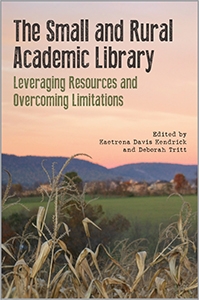Primary tabs
You don't need to be an ALA Member to purchase from the ALA Store, but you'll be asked to create an online account/profile during the checkout to proceed. This Web Account is for both Members and non-Members. Note that your ALA Member discount will be applied at the final step of the checkout process.
If you are Tax-Exempt, please verify that your account is currently set up as exempt before placing your order, as our new fulfillment center will need current documentation. Learn how to verify here.
- Description
- Table of Contents
- About the authors
Small and rural academic libraries struggle with a unique set of technological and institutional barriers—tight budgets, stagnant salaries, small staff, and limited access to current technologies can prevent these active academic librarians from fully participating in professional development. Feelings of isolation, concerns about institutional support, and worries about the perception of the LIS profession within the community can also be issues.
Through the use of case studies, research, and practical interviews, The Small or Rural Academic Library: Leveraging Resources and Overcoming Limitations explores how academic librarians in such environments can keep pace with, create, and improve modern library practices and services, network with colleagues, and access continuing education and professional development opportunities. Additionally, this book acts as a resource on matters of human resources and management concerns that are unique to LIS professionals and paraprofessionals who serve at small campuses and in rural communities.
Introduction
Kaetrena Davis Kendrick and Deborah Tritt
Section One: Library and Outreach Services
Chapter 1. Cracking the Competition: Collaboration in Programming
Kate S. Lewallen
BIG IDEAS, SMALL LIBRARIES. A Personal Touch at Kentucky Christian University
Naulayne R. Enders
Chapter 2. Strengthening the Small Library: Creating Opportunities for Archives Development
Tina Schneider and Calvin Cleary
Chapter 3. Removing Barriers and Building Bridges: Distance Learning Library Services in Small or Rural Academic Libraries
Karla J. Aleman
Section Two: Human Resources and Professional Development
Chapter 4. Strategically Staffing the Small and Rural Academic Library
Marisha C. Kelly, MLIS
BIG IDEAS, SMALL LIBRARIES. Leading Locally
Rebecca Freeman
Chapter 5. Managing Student Workers in the Small Academic Library
Madeline Sims, Laura F. Keyes, and Erica Watson
BIG IDEAS, SMALL LIBRARIES. Staff Engagement for Cohesion
Jennifer Ward and Bethany Wilkes
Section Three: Planning
Chapter 6. Succession Planning at a Small Academic Library
Anne LePage
Chapter 7. Mission Possible: Strategic Planning for Small Academic Libraries
Darla Haines, Rebecca Johnson, Jill Lichtsinn, and Edita Sicken
Section Four: Instruction
Chapter 8. Let's Be Direct about Information Literacy Assessment Using Quick Writes to Gather Authentic Evidence of Student Learning
Henri Mondschein
BIG IDEAS, SMALL LIBRARIES. Livre en place: Embedded Librarianship at a Specialized Library
Valerie Freeman
Chapter 9. Small Academic Libraries and the Culture of Assessment
Jennifer Sterling and Julie Hansen
Section Five: Technology
Chapter 10. Technology Triage: Assessing and Managing Library Systems and Projects
Michael Rodriguez
BIG IDEAS, SMALL LIBRARIES. Being Innovative: Creating Innovative Tutorials
Ustadza Ely
Chapter 11. Instructional Technology and Instructional Space on the Satellite Campus
Amanda Kraft, Elena Rodriguez, and Elaine Holliday
About the Authors
Kaetrena Davis Kendrick
Kaetrena Davis Kendrick, MSLS, is a graduate of the historic Clark Atlanta University School of Library and Information Studies. Currently, she is Assistant Librarian and Assistant Professor at the University of South Carolina Lancaster, where she has expanded outreach, grown instruction, introduced and promoted teaching and learning technologies, and implemented data collection and scholarship curation initiatives on her small campus. Her research interests include racial and ethnic diversity in the LIS field, professionalism, ethics, and the role of digital humanities in practical academic librarianship. In addition to publishing articles on these topics, she is the author of Global Evolution: An Annotated, Chronological Bibliography of International Students in US Academic Libraries (Chicago: ACRL, 2007) and Kaleidoscopic Concern: An Annotated, Chronological Bibliography of Diversity, Recruitment, Retention, and Other Concerns Regarding African American and Ethnic Library Professionals (Chicago: ACRL, 2009).
Deborah Tritt
Deborah Tritt, MLIS, MSIT, is an instruction/reference librarian and assistant professor at the University of South Carolina Aiken's Gregg-Graniteville Library. She is also the archivist for the Gregg-Graniteville Archives and oversees the library's digital collections. She received her Bachelor of Arts degree in Comparative Literature from the University of Georgia, possesses a Master of Library and Information Science, and a Master of Science in Information Technology. Her research focuses on issues surrounding the practice of librarianship in small and rural academic libraries and emerging technologies in libraries.



